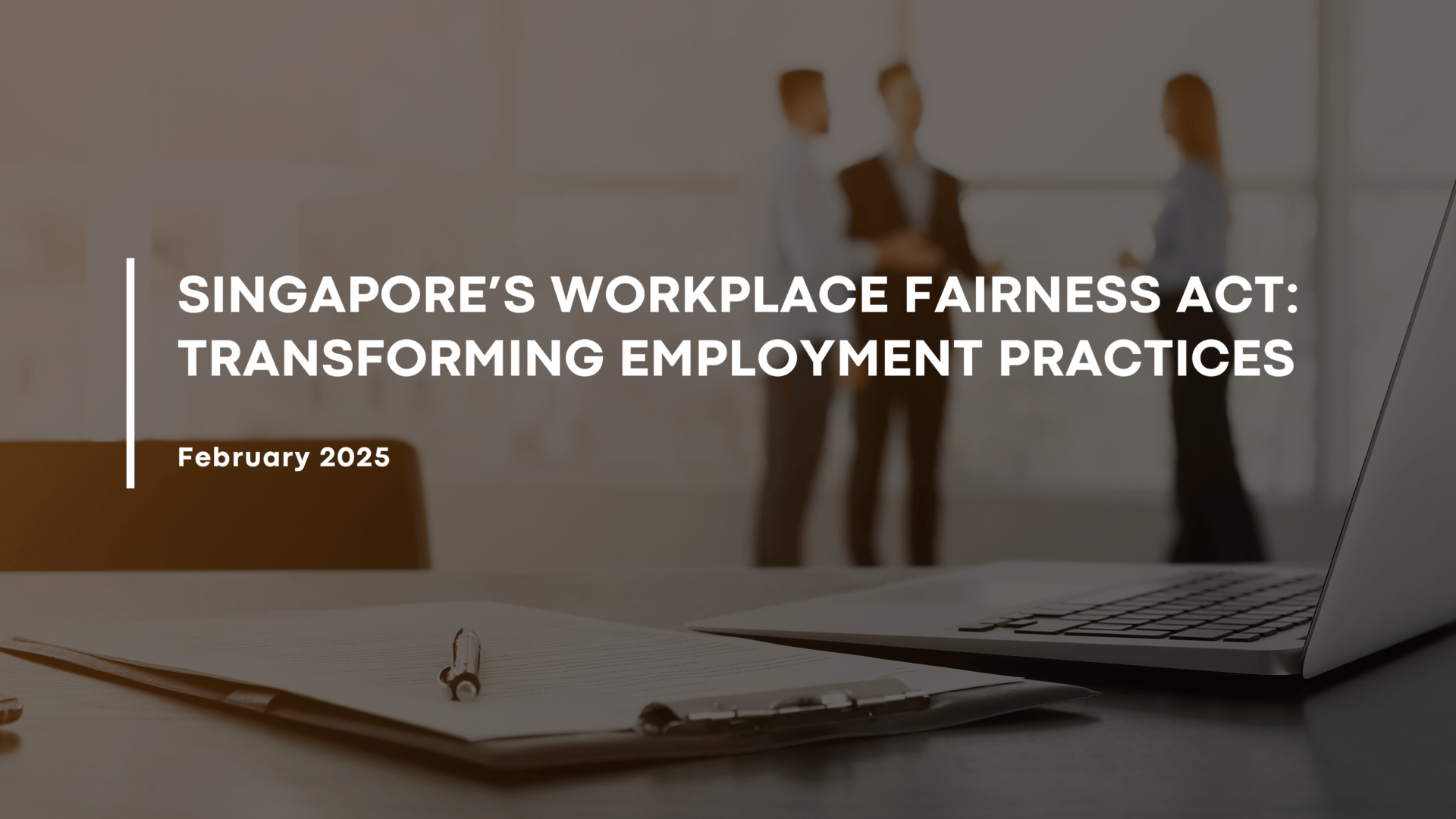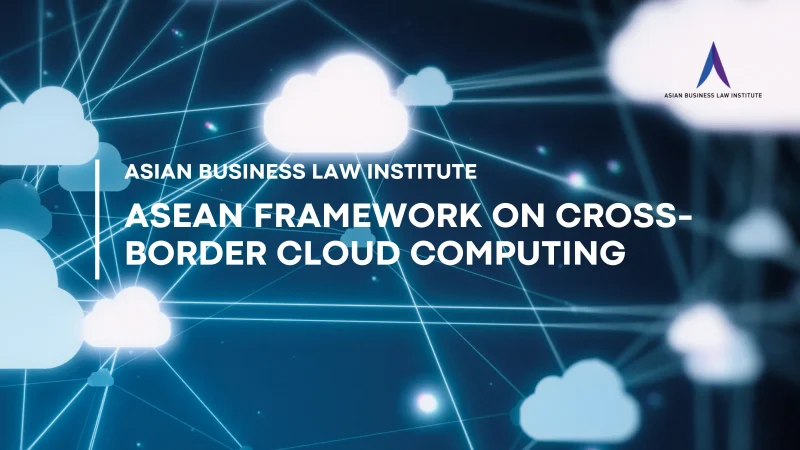On 8 January 2025, the Workplace Fairness Act 2024 (“Act”) was passed by the Singapore Parliament, marking a significant milestone in Singapore’s employment law landscape. The Act reinforces the government’s commitment to fostering equitable workplaces and mandates fairness across hiring, promotions, dismissals, and remuneration.
Key Features of the Workplace Fairness Act
The Act targets workplace discrimination, making it unlawful for employers to base employment decisions on protected characteristics. Businesses are now obliged to demonstrate merit-based decision-making, with evidence to support their practices if and when a dispute arises. Below are key elements of the Act.
- Protected Characteristics
The Act prohibits employers from discrimination against employees based on the following “protected characteristics”:
- Age
- Nationality
- Sex: Referring to sex assigned at birth or reassigned through surgery (not including sexual orientation or gender identity).
- Marital Status
- Pregnancy: Includes past, current, or intended pregnancies.
- Caregiving Responsibilities
- Race
- Religion
- Language Ability
- Disability
- Mental Health Conditions
- Defining Discrimination
Sections 17 to 19 of the Act specify when discrimination occurs. It considers an action discriminatory when employers:
- Make adverse employment decisions linked to a protected characteristic.
- Issue policies or directives that adversely impact individuals based on protected characteristics.
- Publish job advertisements with criteria tied to protected characteristics.
While these provisions strengthen employee protections, the Act recognises practical business needs through specific exemptions which are set out in sections 20 – 24 of the Act.
- Exceptions to Discrimination
A. Genuine Job Requirements
Under Section 20 of the Act, discrimination is permissible when a protected characteristic is a genuine and necessary requirement for a job. The Act defines a genuine job requirement as one that:
- is essential for the job’s performance.
- preserves health, safety, or privacy.
- is mandated by written laws or regulations.
As an example, an audio production manager cannot be reasonably performed by an individual with hearing impairment. Discrimination against the hearing‑impaired individual is not unlawful in relation to the job.
B. Age-Related Exceptions
Section 21 of the Act primarily provides for an exception that allows employers to prefer older workers by allowing discrimination in favour of persons older than a prescribed age in hiring, and discrimination against persons younger than that age in hiring.
C. Nationality-Related Exceptions
Section 22 of the Act acknowledges Singapore’s employment policies prioritising citizens and permanent residents. Employers may:
- Favour Singapore citizens or PRs in hiring or promotions.
- Advertise positions specifying citizenship or PR status as a requirement.
This exception reflects the government’s broader workforce policies, which aims to balance the integration of foreign talent with local employment opportunities.
D. Religious Groups Exemptions
Religious groups are granted specific protections under Section 23 of the Act to preserve their religious identity. The provision allows such groups to:
- Restrict roles related to religious instruction, worship, or management to individuals of the same faith.
- Include faith-based requirements in job advertisements.
For instance, a mosque hiring an imam or a church recruiting a pastor may lawfully require candidates to adhere to the respective religion. This exception ensures that religious institutions can maintain religious doctrinal consistency without contravening the Act.
E. Disability-Focused Exceptions
Section 24 of the Act empowers employers to prioritise candidates with disabilities without it constituting discrimination. Employers may:
- Require a disability as a condition for certain roles.
- State openly in advertisements that having a disability is an advantage.
This provision actively supports diversity and inclusivity efforts by encouraging organisations to create opportunities for individuals with disabilities.
- Penalties
Generally, any act of discrimination within the purview of the Act will be considered a civil contravention. The Act provides mechanisms for enforcement, with penalties calibrated to the severity of violations. In general, the penalties can be categorised as follows:
- Administrative Penalties: Fines for less severe offences, such as failing to maintain proper grievance records. On conviction, the administrative penalty will not exceed S$5,000 for each occasion where the employer is a body corporate, partnership, or unincorporated association, and up to S$10,000 for each second or subsequent occasion of the civil contravention. For individual employers, the offence is punishable to a fine not exceeding S$2,5000 or to imprisonment for a term not exceeding six months or to both.
The range will vary depending on the type of civil contravention, and further details will be provided in subsidiary legislation in due course.
- Serious Civil Penalties: Applied to systemic or severe contraventions, including retaliatory dismissals or discriminatory dismissals. The penalty can only be imposed by the courts, for a sum not exceeding S$50,000 for the first order, and up to S$250,000 for every subsequent order if the employer is a body corporate, partnership, or unincorporated association. For individual employers, the court may order for the payment of a civil penalty not exceeding S$10,000 for the first order, and up to S$50,000 for any other case.
- Grievance Handling
Section 27 of the Act provides the requirement for employers to establish written grievance-handling procedures which include:
- Investigation and Review: Conducted in a fair and impartial manner.
- Outcome Notification: Employees must be informed of grievance outcomes.
- Confidentiality: Employers must maintain employee confidentiality unless disclosure is essential.
- Record Maintenance: Grievance records must be retained for a specified period.
Employees must also be informed in writing about grievance processes.
- Anti-Retaliation
The Act prohibits employers from retaliating against employees who:
- File complaints, provide evidence, raise grievances, or take actions under the Act; or
- Are suspected or known to have done, or intend to do, such actions.
Retaliatory acts include dismissal, withholding re-employment or payments, salary deductions, contract breaches, harassment, or any detriment to employment.
- Restrictions on Contracting Out
The Act also prohibits and renders void any term in a contract if it has the effect of excluding or limiting the operation of the Workplace Fairness Act, or if it prevents anyone from making a complaint, allegation, or raising a grievance under the Act.
This provision ensures that the protections and rights under the Act cannot be waived or undermined by private agreements between employers and employees. Employers must comply fully with the Act, regardless of any agreements with employees.
- Practical Steps for Employers
Compliance with the Act requires thoughtful preparation. Employers should consider the following steps:
- Policy and Process Updates – Review existing anti-discrimination policies and align them with the Act; and implement robust grievance-handling mechanisms and communicate these processes to all employees.
- Training and Education – Educate HR personnel, managers, and employees about the Act and its implications; and conduct workshops on unconscious bias and fair hiring practices.
- Auditing Employment Decisions – Regularly audit hiring, promotions, and dismissal practices to identify potential risks; and standardise employment processes to ensure consistent and fair decision-making.
- Promoting Transparency – Adopt clear documentation practices for employment decisions; and use objective criteria to evaluate employee performance and advancement opportunities.
- Conclusion
The Act introduces significant compliance obligations for businesses, emphasising anti-discrimination and fair treatment in employment practices. Although businesses with fewer than 25 employees are exempt, aligning with the Act’s principles is advisable. Public expectations around fairness are growing, and reputational risks could outweigh immediate cost savings from non-compliance.
The Act presents both challenges and opportunities for businesses. While it requires employers to examine their policies and practices more closely, it also offers the chance to create inclusive workplaces, enhance employee satisfaction, and strengthen reputations.
© PDLegal LLC
This article is intended to provide general information only and does not constitute legal advice. It should not be used as a substitute for professional legal consultation. We recommend seeking legal advice before making any decisions based on the information available in this article. PDLegal fully disclaims responsibility for any loss or damage which may result from relying on this article.
Further information
Should you have any questions on the Workplace Fairness Act 2024 or how this development may affect you or your business, please get in touch with the following person:

